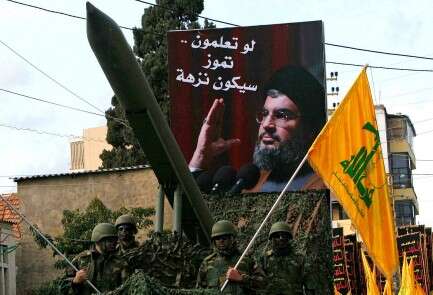Hezbollah's missile arsenal has been static for years and the organization lacks the industrial ability to convert, upgrade or produce precision weapons, Director of Military Intelligence Maj. Gen. Tamir Heyman said Tuesday.
Briefing the Knesset's Foreign Affairs and Defense Committee on the tensions in the northern sector, Heyman said Operation Northern Shield to neutralize Hezbollah tunnels snaking under the Israel-Lebanon border, as well as other measures exercised by the IDF, were part of "an era of disruption and shaping new reality on the ground" the Israeli military is pursuing as part of the "campaign between the wars."
He was referring to a strategic concept that encompasses a host of covert and low-intensity military and intelligence efforts to prevent enemy states and terrorist organizations from becoming stronger and thwart their offensive activity.
"The regional upheavals are waning and we are on the brink of significant changes, which harbor opportunities as well as risks in all sectors," he said.
Commenting on the situation in Syria, Heyman said that Israel was determined to curb Iran's aspiration to entrench itself militarily in Syria, which he said was also a source of friction among decision-makers in Tehran.
This friction has caused Iran's efforts in Syria to slow considerably, he noted.
Iran is facing an economic crisis over the U.S.'s decision to reimpose sanctions on it. so far, Israeli intelligence has been able to successfully warn the relevant entities in the international community as to the Islamic republic's attempts to bypass the American sanctions, he said.
Heyman stressed that despite regional tensions, chances of war remain slim, "As it doesn't seem to be in our enemies' interest at this time."
He nevertheless warned that the volatile situation in all sectors consistently creates conditions for a potential rapid escalation.

Meanwhile, an American think tank released an analysis of Hezbollah's missile arsenal.
The Missile Threat website, a product of the Missile Defense Project at the Center for Strategic and International Studies in Washington, which looks at a wide range of policy, program, and strategic issues related to missile defense, has found that the Shiite terrorist group is in possession of 130,000 rockets and missile, concluding that "Hezbollah is the world's most heavily armed nonstate actor, and has been described as a militia trained like an army and equipped like a state."
The report found that the majority of Hezbollah's arsenal comprises short- and medium-range surface-to-surface, anti-tank and anti-ship missiles that cannot be upgraded to precision-missiles, mostly over Israel's persistent efforts to thwart Iran's attempts to aid Hezbollah in this respect.
The Shiite terrorist group has thousands of Katyusha and Scud missiles, as well as a wide array of Iranian-made projectiles covering various ranges, including Shain, Fajr, Falaq and Zelzal missiles.
While the Scud missile is considered the group's "heavyweight threat," the report noted that they are "usually seen as impractical weapons" as they are "very bulky to transport and difficult to hide and manipulate, requiring 45 minutes of preparation. They do not provide Hezbollah much advantage."




